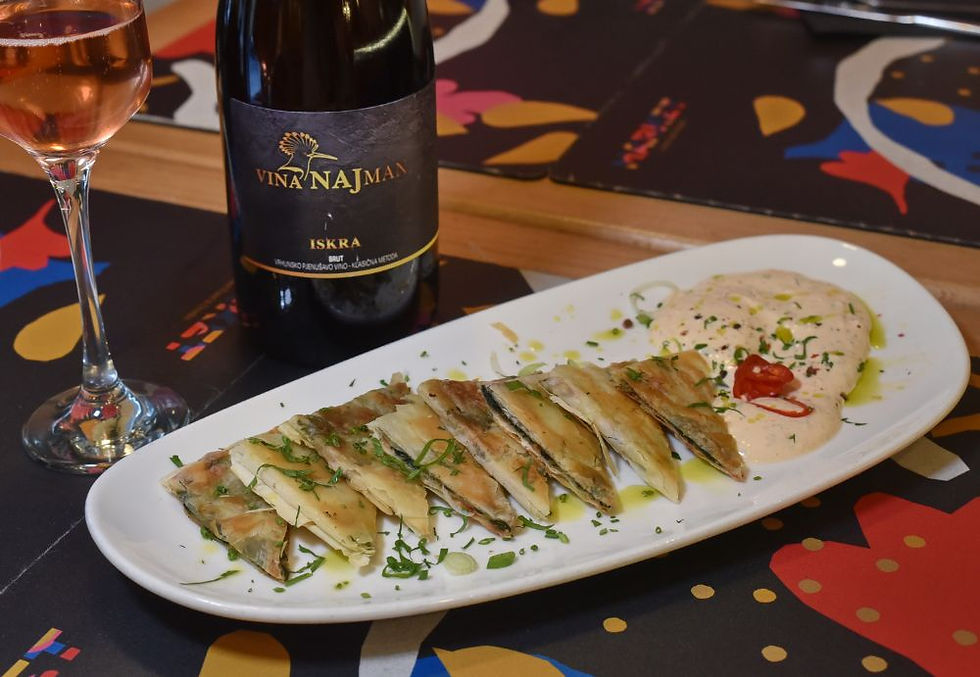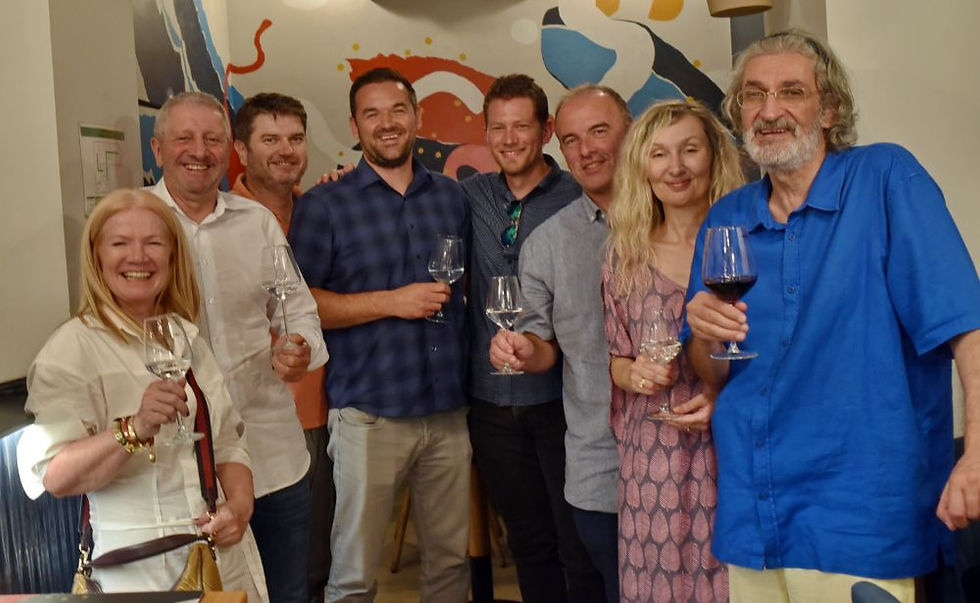26th Wine with the Spoon - Bistro Market
- Taste of Adriatic
- Jun 29, 2025
- 6 min read
The picturesque Market Bistro, located in the very center of Zagreb (Gundulićeva 13), hosted the 26th edition of 'Vina uz žliču', an eno-gastro project by Renate Cisar and Mustafa Topčagić, featuring journalists and wine and gastronomy enthusiasts.

Bistro Market was opened six years ago by Fran Ćurković, a young banker who had taken up gastronomy as a hobby. However, things became more serious when his deconstructed sarma became a real hit at a street food event. Then he decided to take a risky move: quit his job at the bank, borrow money from family and friends, and rent a place on Gundulićeva Street, aiming to offer good food at decent prices. The coronavirus pandemic, which marked his hospitality debut, did not go his way at all. However, he still managed to establish himself as a favorite gastronomic gathering place for young businesspeople. Market was soon recognized by tourists, and conversations in several languages can be heard in the bistro every day. As the business expanded, Ćurković was joined as a co-owner by Hvar restaurateur Antoni Jurica, and the kitchen has been under the firm hand of chef Goran Stanisavljević for five years. He learned from the best in his native Rovinj, including Tom Gretić.

The first imaginative performance was already demonstrated with the finger food that welcomed the media guests, which was Spring Soparnik with homemade sauce. The triangular snacks, richly stuffed with Swiss chard, were accompanied by Iskra Brut sparkling wine from the Najman winery in Zagorje. It was his premiere presentation after he won a silver medal at the Decanter Awards with 92 points, which is an excellent recognition for Dragutin Najman for his work and effort, even though he has been a Decanter subscriber for a long time.

And not only that - his sparkling wine is the best-rated sparkling wine in continental Croatia by Decanter. It is produced using the traditional method from Pinot Noir and aged for two years on yeast, without the addition of any liqueur. The winemaker, Miodrag Hruškar, who has been working with the Najman family in their boutique winery in Martinkovac, near Varaždinske Toplice, for 15 years, is mainly responsible for its preparation. The sparkling wine Iskra is just that - sparkling and energetic, with pronounced freshness, secondary notes of berries and meadow flowers, and it has received another informal recognition. Namely, at every 'Vino uz žliču' event, wine and gastronomy journalists declare the best food and wine pairing, and now for the first time ,it was not one of the dishes on a spoon, but welcome snacks - Soparnik and Najman's sparkling wine.

The socializing at the Market Bistro continued with selected brandies from the Kotal distillery in Cerovlje, Istria. This distillery produces brandies that are 'different from the others', and they follow an old family recipe that has been passed down from generation to generation. Owner Armando Lušetić introduced the guests to Kičica, Kuš, Loza Barik, Ruda and Travarica. Kičica, made from red St. John's wort, has a distinctly bitter taste and is a good remedy for the stomach, Kuš is a sage brandy, very aromatic and a natural antibiotic, Loza Barik is aged in small Slavonian oak barrels, rich in aromas of wood and spices, Ruda has a slightly bitter taste and is excellent as an aperitif and digestif, Travarica is colorless and brewed according to an old recipe with more than ten medicinal herbs. Kotal brandies are also known as 'medežija' (medicines) and do not contain any chemicals or artificial ingredients. The herbs and aromatic plants are hand-picked and, adds Lušetić, each bottle has passed through their hands, which best confirms the exceptional quality of these brandies.

Then, Zoran Kalčić from Vrsar in Istria presented his Kalčić extra-virgin olive oil. The guests, along with the fine homemade sourdough bread that they bake daily at the Market bistro, had the opportunity to taste Buža, Leccino, Istarska bjelica and Selekcija (an ideal combination of the Istarska bjelica, Buža and Rožinjola varieties). The Kalčić family began olive growing and the production and sale of olive oil in 1997. Their plantation, which once consisted of 120 trees, has grown into an impressive olive grove of 1,000 trees spanning an area of 3.5 hectares. They utilize modern technology in the production of olive oil, says Zoran Kalčić, and as a result, the quality of the oil has improved continuously with each passing year. The excellent quality of these olive oils is evident in the numerous awards and recognitions they have won, as well as the satisfied customers who continue to return to them.

Homemade gnocchi stuffed with cheese were the first 'concrete' dish that arrived at the tables, where the guests were greeted by Šoškić Graševina 2024 from Plešivica. The lightly spicy dish, which vegetarians might also like, went well with the fruity and fresh Graševina from the 'Taste of Terroir' line. It is characteristic of last year's harvest that at Šoškić's location in Rebri, the Graševina grapes were harvested for the first time in August, and the wine was released for sale in December. Graševina is the true embodiment of the tradition of Dvorske vina Šoškić, which boasts depth and character. The selected grapes are first fermented in a stainless steel tank, which preserves their purity of taste and aroma. They are then aged for three months in large wooden barrels, maintaining a vibrant, fruity character and freshness. Interestingly, Šoškić's vineyards were created in the area where the country estate of the 'father of the homeland' Dr. Ante Starčević. 110 years later, Zagreb electrical engineer Siniša Šoškić decided to turn his winemaking hobby into a business and planted the first vineyards there, thus beginning to write a new chapter in history.

Along with the Open Raviol a la pileći paprikaš, one of the special creations of Chef Goran Stanisavljević, a truly special wine was poured: Galić Chardonnay 2021, made using the sur lie method. Josip Nikić, sales manager at the Galić winery in Kutjevo, explained that the Chardonnay from this vintage is distinct from the previous one, characterized by its fruity notes of apricots and apples, with hints of vanilla. The wine was aged for nine months in barrique barrels, then 'rested' in stainless steel, then further 'calmed down' in bottles. In this way, the richness and fullness of flavor were preserved, resulting in a modern and characterful wine. The Chardonnay perfectly complemented the spiciness of the Open Ravioli, which was prepared in a soupy manner, similar to Istrian žgvacet. The wine is produced in one of the most modern Croatian wineries, Galić, which has won a dominant position on the market in a relatively short time. This is the result of dedication to quality and love for hand-picked grapes on 60 hectares of vineyards. And it all began with a small vineyard owned by the Josip Galić family and a hectare of the famous 'Lerman's vineyard' located near the chapel of St. Vitus above Požega...

Next on the plate was Pašticada a la Market, a house specialty made from a two-day-cooked beef shank, not a leg. However, it contains all the spices found in classic Dalmatian pašticadas, explained sous chef Filip Lacović, who was in charge of all the kitchen performances this evening. The 2019 Cabernet Sauvignon from the Zlatno brdo winery paired exceptionally well with this richly flavored dish, as agreed upon by sommelier Tomo Jakopović, who presented the wine with, as he said, a strong imprint of terroir. Grapes from the Zmajevac location in Baranja are characterized by high sugar and acidity, which is a reasonable assumption for the long-term durability of the wine. The Zlatno Brdo winery is still young enough to recognize the true potential of its wines for aging. The winery team does not accept compromises, so if they are not satisfied with the quality of the grapes, they do not produce Cabernet Sauvignon every year. Judging by the taste, the 2019 harvest was exceptional. The wine is a dark ruby in color, with extremely fruity aromas of plum and berries. You can also detect the taste of vanilla alongside the aroma of smoked, spicy paprika. You could say - a true representative of Baranja.

Luka Radiček, chief oenologist and head of production of the Slovenian winery Puklavec Family Wines, presented a wine that claims to become a hit of the summer, not only in Dežela, but also in Lijepa naša and on other markets. In the Jeruzalem Ormož winery, which operates as part of the Puklavec wine group, they produced Rumeni muškat 2024 (in Croatian: Žuti muškat), which has only 6% alcohol. Muscat grapes typically yield about 10.5% alcohol, but by using the stopped fermentation method, the alcohol content was reduced to 6%, aligning with the global trend of enjoying less alcoholic beverages, especially among the younger generation. Oenologist Radiček joked that the excellent refreshing Tiramisu, which was served as dessert, contained more alcohol than their Rumen Muscat. Radiček, by the way, is from Zagreb, who has already proven himself in two large Croatian wineries, but his talent has also been noticed on the other side of the Drava. The wines of the Jeruzalem Ormož brand are well known on the Croatian market, where they generate annual sales of almost 2 million euros. After the Netherlands, Croatia is their most important export market, and their yellow labels have been recognizable in our supermarkets and restaurants for decades.

This was the last summer edition of 'Vina uz žliču', from which the duo Cisar/Topčagić sends the following message: 'We wish winemakers a successful harvest, and caterers lots of good recipes, a rich harvest and quality ingredients in the fall, when we will meet again with our wine and food lovers in another place.
FAMA / Foto: Julio Frangen





Comments